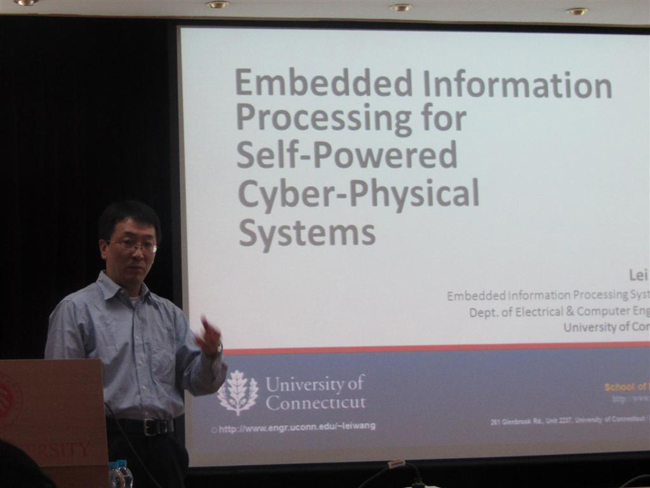May 31, 2012 - Prof. Lei Wang from University of Connecticut visited CECA and gave a talk on "Embedded Information Processing for Self-Powered Cyber-Physical Systems".

Abstract: Embedded information processing is core to various applications that require real-time sensing, signal processing, communication and computation functions. Recently, new applications of autonomous distributed cyber-physical systems have received growing interests. These systems pose significant challenges for dedicated in situ information processing, due to the high communication costs and a limited supply of steady, reliable energy sources. This talk provides an overview of the fundamental challenges in cyber-physical systems through an example of self-powered underwater sensor network. While most portable electronic devices can be powered by batteries, for coastal undersea sensing, a dynamic, inexpensive and maintenance-free energy source is needed. Microbial fuel cells (MFCs) are an attractive renewable energy source in aquatic environments due to the ready availability of biological materials. This renewable energy technology holds strong promise to power embedded information processing if the related system implications can be fully understood and effectively managed. In particular, self-powered cyber-physical systems must be able to deliver a satisfactory performance using renewable energy sources that show a high level of uncertainties due to the highly dynamic environmental conditions. This requires a paradigm shift from deterministic performance-driven design optimization to dynamic system management that adjusts the system performance and complexity in adaptation with energy uncertainties. In this talk, key issues in the design of self-powered cyber-physical systems, such as energy adaption and error resilience, will be discussed. A number of techniques are developed that form a unified energy-performance framework facilitating deep coupling of energy harvesting technologies, dedicated hardware platforms, and computational algorithms.
Biography: Lei Wang received the B. Engr. degree and the M. Engr. degree from Tsinghua University, China, in 1992 and 1996, respectively, and the Ph.D. degree from the University of Illinois at Urbana-Champaign in 2001.
During the summer of 1999, he worked at Microprocessor Research Laboratories, Intel Corporation, where his work involved the development of high-speed and noise-tolerant VLSI circuits and design methodologies. From December 2001 to July 2004, he was with Microprocessor Technology Laboratories, Hewlett-Packard Company, where he participated in the design of the first dual-core multi-threaded Itanium Architecture Processor, a joint project between Intel and Hewlett-Packard. Since August 2004, he has been with the Department of Electrical and Computer Engineering, University of Connecticut, where he is presently an Associate Professor.
Dr. Wang received the US National Science Foundation CAREER Award in 2010. He is a member of IEEE Signal Processing Society Technical Committee on Design and Implementation of Signal Processing Systems. He currently serves as an Associate Editor for the IEEE Transactions on Computers and for the IEEE Signal Processing Letters. He has served on Technical Program Committees of various international conferences. Dr. Wang is a Senior Member of IEEE.